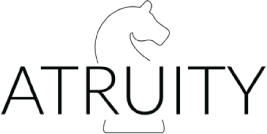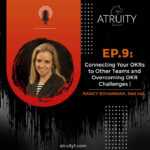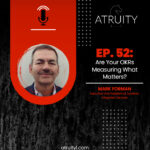Choosing the right OKR software for a Salesforce-dependent business
Salesforce is the #1 CRM in the market and an extremely important tool for many companies, acting as their backbone in many cases. Many organizations actively utilize Salesforce for their business operations and rely on it for more than just their sales funnels.
If your business falls under that umbrella and you’re reading this blog post, you must be looking at implementing the OKR practice within your organization and wondering what your options are.
Benefits of Implementing OKRs
The benefits of adopting OKRs within your business are well-documented, both right here on the Atruity website and in most other goal & performance management communities, with John Doerr defining them in his book “Measure What Matters.”
John is one of the founding fathers of OKRs and the one responsible for introducing them to Google in 1999. He identified 5 key benefits to implementing OKRs in an organization. These 5 key benefits are:
· Focus – by prioritizing the most important goals
· Alignment – by ensuring all tasks contribute towards the company goal
· Commitment – by providing transparency on who is responsible for what
· Tracking – by measuring progress and doing weekly check-ins
· Stretching – by striving to achieve bigger and better results
Choosing a Salesforce-Integrated OKR Software Tool
Many experts agree that OKRs can provide immense value to organizations, but with so many different tools and software options out there, it can be difficult to decide which one to invest in. In addition, as a Salesforce-dependent business, it is extremely important that any OKR tool you consider is able to integrate with your Salesforce org in one way or another.
This is because having an OKR tool that works with Salesforce comes with many benefits, one of them being the ability to have your OKR progress get updated automatically by binding key results to your organization’s Salesforce reports.
What makes this feature so useful for businesses that actively use Salesforce is the fact that it makes adopting OKRs in your organization so much easier. One of the most difficult parts of implementing OKRs within an organization is convincing everyone to actively update them when progress has been made, so when OKRs don’t have to be manually updated all the time, people are more likely to adopt and commit to them!
The good news is that most of the OKR tools on the market that offer Salesforce integration offer this feature as part of it.
That being said, not every tool does it the same way.
Read below to see how Martin Borthiry, co-founder of Axy7, discusses Axy OKR and its Salesforce benefits on the OKRs Q&A Podcast. Axy OKR is an OKR performance management tool built entirely within Salesforce, which means that it has the same look and feel as the platform itself. This makes it extremely intuitive for Salesforce users to learn which makes the adoption of OKRs within organizations much easier.
What makes Axy OKR unique is that since it is a part of Salesforce, it means that your data never leaves the platform (which is important for data security & reliability) and you also get to utilize the same permission sets and customizations that your Salesforce org already uses.
Axy OKR offers a free 30-day trial and you can also schedule a demo with the Axy7 team if you wish to get a personalized walkthrough of the tool. For more information, check out their website or Axy OKR on the Appexchange.
OKRs Q&A Podcast Episode with Martin Borthiry – Co Founder of Axy7
(Click Here to Listen to the Episode)
Tim Meinhardt:
Welcome everyone to another exciting episode of the OKRs Q&A Podcast, also known as the OKR Corral, where OKR insight is the King. I’m your host, Tim Meinhardt president and CEO of Atruity, an OKR consultancy headquartered in our Nation’s capital. Before we begin, if you’re an OKR fan and enjoy our Podcast, please subscribe, leave a review and explore our website at atruity1.com. Finally, should you have a burning question you’d like addressed in future episodes, please drop us a note at contact@atruity1.com. In this exciting episode, we have the distinct pleasure of spending some time with Martin Borthiry, the co-founder of Axy7, an OKR software company located in Europe. Actually, Axy7 is an ISV Salesforce partner providing AppExchange applications for data quality and goal management specializing in the OKR marketplace. Martin is an IT engineer with over 20 years of experience working in business analysis, software implementation and architecture design for enterprise software solutions.
An entrepreneur passionate about the Salesforce ecosystems since 2006, he is a highly experienced consultant and an executive for several IT startups. Martin provides some unique perspective into the world of OKRs and OKR software. So please everyone grab that cup of coffee or your favorite beverage, put it in those ear buds and enjoy our episode.
So Martin, welcome to the program. Before we get started, I want everyone to know a little bit about you, but before we begin, we were talking offline here for a second and we were discussing the first time you and I met, which was when you spoke about listening to our Podcast and I’d love for you to share with our audience how you found our Podcast and why it allows you to complete your exercise and run much more efficiently.
Martin Borthiry:
Thank you, Tim, for your time and that is a pretty good question. My name is Martin Borthiry. I am CEO of Axy7 and we are a company that is focused on creating software, mainly focused on OKR software. The team was really excited about all the materials that you were publishing and saying “These people are great. These people are providing really good materials and the Podcast has a lot of good stories.” So I’m working from home now in this crazy time where everybody is working from home and the only time that I have is when I go outside for running. So I started listening to your Podcast and I started running longer and taking more time just to listen another episode. So thank you for sharing all of this good material with the rest of the world because I believe that it’s pretty good.
Tim Meinhardt:
Thank you, Martin. Gosh, that is so kind. I remember when you said that I was really touched. Okay. So let’s dig into this OKR world a little bit with you because people are going to love what you have to say. So what would you say the state of the global OKR market is today?
Martin Borthiry:
I believe now that the OKR framework is more relevant than ever before. The main reason for that is not just because a company can keep having the same mindset of a new company, which needs to grow really fast, adapt really fast and have team alignment. But with COVID, the pandemic is changing everything every month and people are working from home so this framework, from my point of view, makes an excellent tool that is helping the companies to drive efficiency. So the companies are embracing and are looking more and more for these type of solutions so they can overcome this situation.
Tim Meinhardt:
Right. Absolutely. Well, thank you for that. So tell our audience a little bit about your OKR software and how your software brings an OKR program together.
Martin Borthiry:
So our company is an ISV partner of Salesforce. Salesforce is a CRM, the most used CRM in the world and actually 90% of the company, over 100 functions, are working with Salesforce. So we have been working in this market for 15 years and we started building some software related to data quality, but like four years ago, we discovered that the Framework of the OKR was really important. We were using Salesforce every single day for our operations. So, when we started using Salesforce and OKRs combined, it was a natural adoption for the team. So basically, our software is a native solution within Salesforce that we are offering, and it works for every company that is using Salesforce for operations, Sales support and many other things that you can do in that platform. It is the best advantage for our customers and a natural adoption for the customers.
However, we have encountered many failures before. It’s not just like you install this application. Everybody’s is used to Salesforce, so everybody understands how to use the tool. However, the secret of the OKRs is not just that you understand how to use it, but you need to learn how to crop them and not just that, you also need some sponsorship from the company. So I believe that after finding the right tool for you, which could be an actual tool, could be a software solution or could be our solution. After you find this tool, you really need to enable your team to understand what is behind one objective and what is behind a key result? So you need to train the people to understand how to crop properly, how to define properly in a balanced way, especially with the key results.
Now I know with many companies that the first feeling that they have with the team is that the team is just building a to-do list. No, they are building some kind of a task list with the key results and they are tracking progress of that. So they are not like fully understanding this. So it’s crucial to have a good program where the people understand the essence of the Framework and then for us, with our customers, the adoption of the tool is natural.
Tim Meinhardt:
Wonderful. Thank you. And kind of to that point a little bit, what do you think are some of the largest challenges to putting an OKR program together and really getting it launched successfully?
Martin Borthiry:
Okay. So let me tell you, because we have around 30 customers using successfully, but we failed with many of those customers at the beginning. Some of them had experience in the executive level using OKRs. However, as I told you, when they tried to expand the use of that Framework to every single employee, they failed. They hire some consultancy to train the people and to actually try to transmit the proper use of the OKR. When one of the plaster company that I worked, they were did amazing back when the CEO actually embraced the practice and was the main sponsor of the practice.
He worked really close to the consultant that was implementing that and the secret for them was to have a team of champions for every single country and department. So they really push really hard with a good tool with a good program of training, but also with an internal team that enabled the people to actually transform into an OKR living culture. They made it so every single meeting that they had, the OKRs were on top of everything. So I really liked that experience and we are starting to push our customers in that direction. It’s a combination of different factors. The success is not just one with Software and one with Framework, you need a combination of different factors.
Tim Meinhardt:
I couldn’t agree with you more Martin. In fact, we’ve just recently published a small E-book that we give away. In fact, for our audience, if you want a copy, you can email contact@atruity1.com. It is the 7 C’S of OKR Success that we’ve identified and that we think you should keep an eye on as you go through an implementation because you’re a 100% right. It isn’t just one single thing, but it’s having that overall concept of where it is that we want to get going. You also mentioned a critical component which is that you do need that C-suite behind you to swim upstream right out of the gate and that it is a very, very difficult event to try to make a successful implementation. Then we listed as the second C, which is the champion, making sure you have some champion that is passionate, that understands OKRs, that’s committed to this, that they’re willing to be able to work with everyone and stay engaged when things get started.
And as you know, Martin, look, this is about, and I hate to use the term failing forward, but it really is about learning how to do OKRs. That journey that everybody goes on, it sometimes is a little bit different and unique for everybody. Right before this Podcast, I was working with a particular organization that’s new to OKRs and where they were 10 days ago and where they are today. They have moved mountains, but they’ve just started on their journey. Wouldn’t you agree with me that it really is a journey.
Martin Borthiry:
It’s a journey. Totally, and you need to learn a lot and you need to adapt constantly on that journey because something what is good for your company today, probably you need for that other time. So like you said – total journey.
Tim Meinhardt:
Yep. So, all right, Axy7. What makes your Software organization one of the leading providers of OKR programs?
Martin Borthiry:
Okay. Then I probably will repeat myself with this, but we are a Salesforce ISV partner. We have been working in this environment for more than 15 years. Our team is really experienced on this platform and Salesforce is not just a CRM, but it’s a platform. You have different solutions for different industries, and you have a lot of good things. So, our solution is basically that one of the biggest components that we have for this success is, as I mentioned, is the adoption, the natural adoption of our customers, because they are not feeling that they need to go somewhere else to fulfill the information, just to complete a check. How is the progress of the key result? How is the alignment of my objectives? But they are just working on the opportunities on the cases, on the leads, on the campaigns, on the marketing and by doing that job constantly – the OKRs are there.
So we try to be, in a natural way, in the same environment that they are used to working in. But the secret (our secret) is the platform itself. Now, the platform is compliant and is one of the most secure Cloud compliant platforms that you have in the market. You can customize the platform and it is really easy to extend our product. If you want to measure something else and you have a technical team, those things can expand. Our product can modify a bit like how it can be integrated with many other things or like SAP and you can bring a lot of information.
So the shifting is going to push the information and other people are going to push information into the system. You have tools like analytics, artificial intelligence and in fact, we are driving a pilot program right now of generating a lot of good information on top of the key results using machine learning. But using machine learning, we are trying to integrate here like saying, okay, so for this key result., we grab a lot of this information regarding the experience of the person that is putting the information there like what is the position of that people, the rest of the information that we have in the system, and we combine all that data. We have different models of machine learning that is actually giving a lot of hints and alert to those champions or the manager of the leaders that actually want to help that person to, to drive results, to work those key results. So the platform is giving a lot of opportunity for our company and we are using every single component of Salesforce.
Tim Meinhardt:
You know, that AI and ML right now is a very, very hot topic and it makes such logical sense that one of the discussions I have with people is what do we actually measure? And it’s an inexact science of sorts, but the more that you do measure, you begin to realize what those key things that may be a little bit different than one other measurement. And so through having that ability, that might be a wonderful differentiator for our audience to consider. So how about anything else? Anything else you want to mention about your organization and maybe where the vision of your organization is heading here, and is it in that, space of AI and ML? I like the fact that, when you’re in Salesforce, you can just, you don’t have to enter another program and your operation is right inside there. I think that’s helpful you know, because people get a little bit Software crazy, going from system to system.
Martin Borthiry:
Yeah, it was through our customers sharing that feeling that when they have to implement something that is new, that the people used to be reluctant to adopt new practice and to do something else. So that’s the reason why we took that route with it. So, talking about our vision our right now, we’re trying to combine all the innovation, all the good tools, because we are a technical company and you know, we build software. We are really passionate about all the innovations that we are rolling out. So, what we want to do is just try to create a concept of a OKR centric solution to help the employees and remote employees that are in this system. So, we have a really extensive and hard roadmap that we want to deliver to help employees that are working remotely, because we believe that all the communication, if you can put the OKR one day, OKR is understood and is adopted by the employees.
You can drive the entire communication, alignment and feedback and motivation on top of that. So we are setting a lot of different features, like the One-on-One, the Check-ins, the information, the reviews, the training and a lot of things that are a combination of different solutions that we have just to enable the employee to be well-communicated with the rest of the peers, with the supporting staff, with your manager, and feel the whole time that you are helping actually to be successful in your company and to achieve all the goals of that, the company goals now, because we believe that the company should have one top goal and everybody should contribute in that direction.
Tim Meinhardt:
Wonderful. Thank you. Martin, this has been a wonderful discussion. I can’t tell you what a pleasure it is to have you on our program. And as I mentioned, and to my audience, that when I first met Martin, he said, Tim, I love your program.
Martin Borthiry:
I really love it.
Tim Meinhardt:
When I go out and I run, and I said, Martin, you have to be on our program. So today Martin, you’re on our program and I can’t thank you enough for doing so. Any last insight that you’d like to share with our audience about objectives and key results and as they marched toward their journey and successfully implementing OKRs?
Martin Borthiry:
Okay. Thank you very much for your patience and your time. Having me on this amazing program, actually I really enjoy every single post and what I would like to share with the people is just to be patient, just understand what is the essence and more, if you are in the leadership position, if you are in the executive team and you want to see some results over time, you need to be patient and you need to understand that until this became part of the culture of the company, you’re not going to see actual, amazing results. You are going to have to take risks to have good results. However, when you reach the point that everybody is following this practice, there are results are going to be amazing. So have patience and iterate a couple of times on that program for you.
Tim Meinhardt:
Well, Martin, thank you and that’s wonderful insight. I agree with you completely, that patience and taking your time and allowing people the chance to become comfortable with it, is where truly you get those profound results as you move through the journey. So again, thank you so much for being on the program. I wish you all the best this year in 2021. And I look forward to speaking with you again soon.
Martin Borthiry:
Thank you very much Tim.
Tim Meinhardt:
Bye bye now.
Listen to Martin’s Episode on the OKRs Q&A Podcast at the links below:



